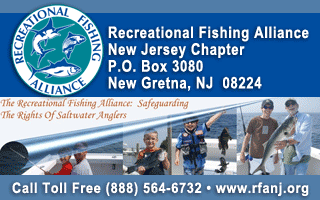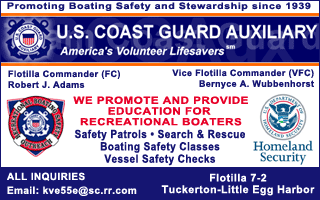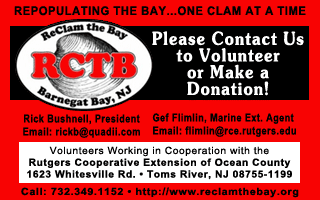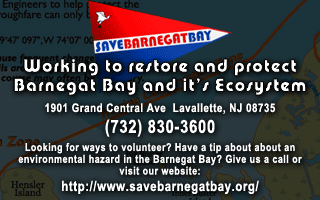
Cold weather and cold water can lead to dangerous situations... your boat and safety gear need to have you prepared for any situation!
By Tom Vassallo
Most saltwater anglers wait with breathless anticipation of those magical autumn moments when the surface of the sea boils with bait and your drag screams line after a huge striper chases down your umbrella rig ...or maybe you dream of the glistening midnight moon reflecting from the bay ripples just as you feel the "tap-tap" of a lunker linesider inhaling your live eel. Well, when the "Fall Run" finally arrives and you are ready for that night eeling trip or ready to head out to troll those umbrella rigs and bunker spoons in cold ocean temperatures, you need to be certain to have all your fishing gear prepped and ready for action. But another serious and important consideration is that your boat is prepped and ready for cold weather action as well!
No other time of year can compare to New Jersey's great autumn striper and bluefish action as the fish migrate past our Jersey Shore waters on their way to more temperate southern waters. But that great fishing is directly linked to falling temperatures in both the air and water. Through summer, most anglers don't pay much attention to the air and water temperatures as the high temperatures of the air and water would not be as much of a concern in the event of a stranded or capsized vessel. However, in the event of a stranded or capsized vessel in the near freezing air temperatures and the frigid water temperatures of late fall and early winter, those conditions can be a serious concern. But having yourself and your vessel prepared for an emergency situation could mean the difference between some minor discomfort and serious injury or possibly even a fatality.
The U.S. Coast Guard Auxiliary Public Affairs offers some good advice for those who are considering cold weather boating. First, they stress the importance of wearing a life jacket. This is even more critical when the danger for hypothermia is added to other concerns. "Hypothermia" is a medical emergency that occurs when your body loses heat faster than it can produce heat, causing a dangerously low body temperature. Hypothermia is most often caused by exposure to cold weather or immersion in a cold body of water. This can be the consequence of a boating accident or a boater being thrown overboard by rough seas or a rogue wave. It can even be caused by a simple boat wake.
According to the American Boating Association web site, sudden immersion in cold water can have severe physiological consequences, including cardiac arrest, quick loss of body heat (the body loses heat 25 times faster in cold water than in cold air) and involuntary inhalation of water (gasping) that results in drowning. Wearing a life jacket can keep the boater's head above water, keep the person warm, and provide a chance for rescue.
Clothing also contributes to more enjoyable and safer cold weather boating. I know that when I have gone striper fishing after dark in late November, I had to wear thermal underwear and insulated coveralls to remain comfortable while fishing. So be sure to wear the proper clothing on those cold evening striper trips. Always consider layering clothing, and if you own a wet suit or dry suit, they can certainly help ward off hypothermia.
The Coast Guard Auxiliary offers these additional tips for safe winter boating:
Assess the risks ... think what can go wrong and be fully equipped and prepared.
Leave a float plan with a responsible individual who knows your intentions, location, and who to call if you fail to return as scheduled.
Carry a VHF radio and an EPIRB (Emergency Position Indicating Radio Beacon), signal flares and other means to draw attention to your location.
Be prepared for the shock of sudden immersion and the incapacitating effects of cold water ... "dress to get wet" and always carry a change of clothing in a waterproof container.
Be aware of activity around your vessel and potential for fast-changing weather.
Boat safe and sober ...save the alcohol for when you’ve safely returned.
Refresh your seamanship skills ...take a boating safety course offered by your local Coast Guard Auxiliary flotilla.
Last but certainly not least, be sure your vessel is in good operating condition and has the necessary safety equipment on board before you leave the dock.
Tom Mackie, owner of Mac's Dock and South Harbor Marine in Waretown, NJ has kindly forwarded FishinJersey.com with a "Boating Safety Checklist" produced under a grant from the Sport Fish Restoration and Boating Trust Fund, which is in turn administered by the U.S. Coast Guard. This document includes a checklist of all items required under boating regulations as well as recommended items for your vessel. You can download a PDF copy of the checklist by clicking on the following link:
No other time of year can compare to the fabulous fall fishing in New Jersey. With a little planning and knowledge you can ensure that your fall bassin' trips are not only fun, but also done safely on a safe vessel. You will return home safely and ensure many more enjoyable fall fishing trips in the future!














